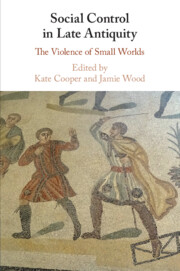Book contents
- Social Control in Late Antiquity
- Social Control in Late Antiquity
- Copyright page
- Contents
- Contributors
- Preface and Acknowledgements
- Abbreviations
- Introduction
- Part I Women and Children First
- Part II ‘Slaves, be subject to your masters’
- Part III Knowledge, Power, and Symbolic Violence
- Part IV Vulnerability and Power
- Chapter 13 Reading Thecla in Fourth-Century Pontus
- Chapter 14 Family Heroines
- Chapter 15 Women on the Edge
- Bibliography
- Index
Chapter 13 - Reading Thecla in Fourth-Century Pontus
Violence, Virginity, and Female Autonomy in Gregory of Nyssa’s Life of Macrina
from Part IV - Vulnerability and Power
Published online by Cambridge University Press: 18 September 2020
- Social Control in Late Antiquity
- Social Control in Late Antiquity
- Copyright page
- Contents
- Contributors
- Preface and Acknowledgements
- Abbreviations
- Introduction
- Part I Women and Children First
- Part II ‘Slaves, be subject to your masters’
- Part III Knowledge, Power, and Symbolic Violence
- Part IV Vulnerability and Power
- Chapter 13 Reading Thecla in Fourth-Century Pontus
- Chapter 14 Family Heroines
- Chapter 15 Women on the Edge
- Bibliography
- Index
Summary
This chapter uses three stories of young women’s relationships with their parents to increase our understanding of Christianity’s impact on classic familial values in late antiquity. It is focused on the ways in which the famous second century story of the virgin Thecla, and her difficult relationship with her mother Theocleia, was read and reused in later Christian stories. In the Passion of Eugenia we see how Thecla’s story becomes a catalyst for the eponymous heroine to follow Thecla’s example and reject the marriage proposed for her. She does so, however, without creating the rift with her parents that Thecla’s departure necessitates. That careful reuse demonstrates the developing uncertainty over whether the rise of Christian asceticism necessitated the destruction of the traditional household. In Gregory of Nyssa’s Life of Macrina, we see the Cappadocian bishop again using Thecla to think with, as he feels his way towards a new solution to this same problem. These case studies not only show us the changing landscape of Christian thinking on marriage, family, and asceticism, but also reveal the complex matrix of meanings latent in the original Acts of Paul and Thecla.
- Type
- Chapter
- Information
- Social Control in Late AntiquityThe Violence of Small Worlds, pp. 277 - 298Publisher: Cambridge University PressPrint publication year: 2020

